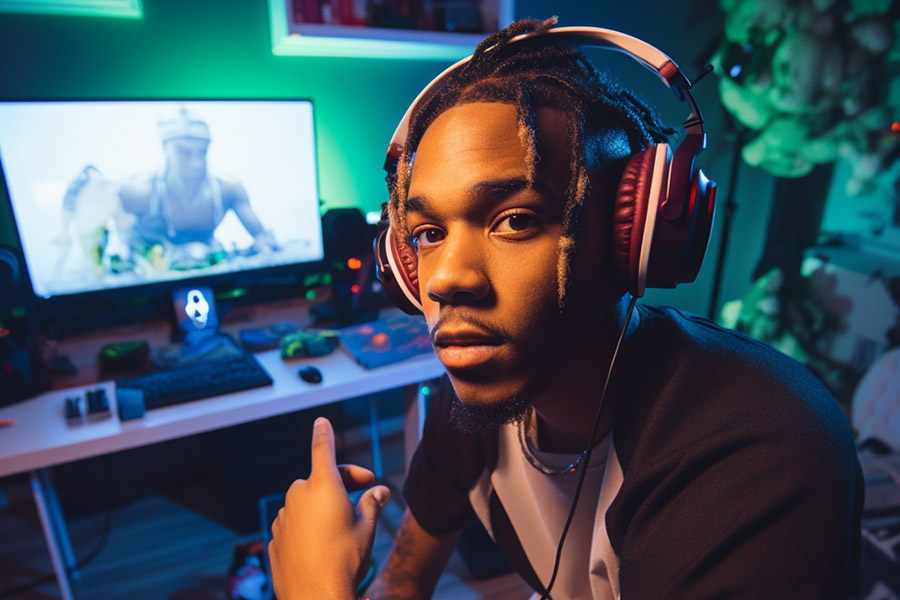
YouTuber
Will AI replace YouTubers?
YouTubers and influencers are successful because of their ability to connect with an audience on a personal level. They are entertainers first and foremost, and produce exciting content that resonates with viewers in a way that feels authentic, personal and relatable. While AI may be able to generate content on a large scale, AI cannot replicate the nuance of human emotion, personality and humo(u)r, that make YouTubers compelling and entertaining to watch.
It's all about Personality
Fans watch and subscribe to YouTubers because of their personality, and personality is the antithesis of AI.
In this respect, the prospects for YouTubers, in an age of AI displacement, are similar to that of comedians, TV hosts and other entertainers. They have one of the biggest "moats", protecting their jobs from AI takeover.
That's not to say that some YouTubers, who are producing less personality-driven content, won't be affected in some ways - growing competition from AI generated content for example (e.g. in education, gaming, Q&A) - but generally when we speak of YouTubers in the context of a 'job', this tends to mean YouTubers with sustainable fanbases, who people subscribe to because of their personality, charisma, knowledge and talent.
YouTubers understand their Audience
YouTubers are skilled at creating content that is tailored to their audience and niche. They understand their viewers’ preferences and interests, and create content that appeals to that. They are often experimenting with formats, styles, and topics to keep their videos fresh and engaging. This level of creativity and innovation is not something that AI can easily replicate, as it lacks the ability to think outside the box, has no experience of life, and is incapable of feeling emotion. These are distinctly human qualities, that only humans understand.
Can we trust AI?
There is also an issue of trust. YouTubers build a relationship of trust and community with their audience over time. This trust and connection on a personal level, is not easily replicated by AI. If you subscribe to someone on YouTube, you're not going to want to see that person replaced by a robot.
AI and Humanoid performers in the Future
There is of course the possibility and likelihood that convincing and lifelike humanoid YouTube performers, and AI performers become a reality in future. But similar to other entertainment professions, this is unlikely to be more than a novelty act, in most cases. There will be exceptions, but the history of virtual entertainers is filled with examples where virtual entertainers were no more than a passing fad. A Japanese virtual popstar named 'Kyoko Date' for example in the 90's is one of the earliest examples. After the initial hype and media interest died down, the virtual pop star found little to no interest among fans. It didn't feel authentic to people.
VTubers
In more recent times we have seen examples of virtual YouTubers, or VTubers, who are animated characters that interact with their audiences in real time. While these types of creators can be entertaining and novel, again it is unlikely that they will seriously threaten the livelihoods of human YouTubers and influencers, on any kind of significant scale.
Humans like to watch humans.
Practical matters
It takes a wide range of skills to create engaging content on YouTube that attracts a large audience. If it was easy, everyone would be doing it. How could AI realistically replicate someone like Marques Brownlee, Mark Rober, or Mr. Beast? It's just not very conceivable.
Creating the kind of content these YouTubers produce, requires creativity, production skills, domain knowledge, marketing skills, personality, communication skills, and a huge amount of logistical and often team effort. It would similarly take a team of people to support an AI YouTuber in the foreseeable future, which would kind of make the effort redundant.
What would generated YouTube content look like?
As suggested, there will surely be AI YouTubers in future, and even humanoid robot YouTubers. They will be highly realistic looking before long. We already have AI photo generation that is indistinguishable from real photos. It's just a single order of magnitude technology-wise to produce 'indistinguishable from real life' video. Indeed we can realistically expect that to be with us in 2-5 years.
This will certainly have an impact. Creators from other disciplines, who are perhaps not naturals on video themselves, may be strongly motivated to experiment with making their own alter-egos on YouTube, as tools for this become widely available.
But again, how likely are we as humans going to want to watch these virtual humans? Authenticity is likely to become more and more important in life, as it becomes more and more challenging to know what is real. (Or perhaps we will trivially use AI on itself, to determine this, and it will be a non-issue).
Society has a tendency to fawn over new technologies initially, but people tend to stick with entertainment that feels familiar, or perhaps more specifically, that which we grew up with. Younger people of today are YouTube natives. They are growing up with personalities they've grown fond of over years on YouTube. Are they going to want to watch androids when they are older?
History suggests this is unlikely.
Predicting what future generations - the AI-native and robot-native generations will want and think in future is more challenging, but we can only hope that at the end of the day, authenticity and human talent wins through for upcoming generations as well.
Conclusion
YouTubers are entertainers, and humans like to watch humans to be entertained. We still watch movies and the latest Netflix shows, even though the format was invented 100 years ago.
This longevity of format is informative, and when it comes to entertainment we tend to stick with the things we enjoyed when we were younger.
As such, YouTubers should rest easy that their existing audiences are unlikely to wholesale migrate to new formats of entertainment, and what fundamentally amounts to an inauthentic replica of what they already enjoy.
As such, YouTubers are going to be generally very safe from AI, in all likelihood for the rest of their (human) lives.
UPDATE: Casey Neistat has published a superb video on the 'lack of soul' with AI generated content. Recommended...
Conclusion: Very Safe | Time Period: 20-50 years


